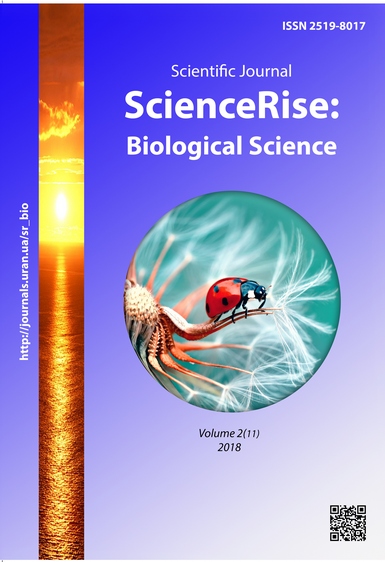Results of monitoring the quality of drinking water in bottles and from points of bottling for sanitary-chemical indicators
DOI:
https://doi.org/10.15587/2519-8025.2018.129681Keywords:
bottled potable water, point of bottling, tertiary treatment of potable waterAbstract
It was determined that 57 % of samples of potable water from points of bottling and bottled water after the direct installation of equipment or after their long production didn’t meet the hygienic requirements. Every second sample of potable water after additional treatment of tap potable water, especially for surface sources of potable water supply, didn’t meet the hygienic requirements for the trihalomethanes (THMs) content. The most common method of reverse osmosis couldn’t remove from the water more than 40–60 % of THMs, what is not always taken into consideration by manufacturers in installation of modern systems for tertiary treatment of potable water with multiple modules. Among the 33 different samples of tertiary treated tap water and 38 samples of groundwater, which quality didn’t meet the hygienic requirements, nearly 33 % and 24 % respectively (significantly more in fact) had dry residue less than 100 mg/l. Depending on the frequency of not meeting the hygienic requirements, indicators of potable water quality can be placed in the following row: chloroform and other THMs > dry residue > permanganate demand > color > ammonium and nitrates > phenols > hydrogen ion exponent, silicon, sodium, chlorides, iodine ( for the potable waters produced from the tap water); silicon > dry residue > color > nitrates > alkalinity, manganese, hydrogen ion exponent, total hardness, turbidity > total iron > fluorine, permanganate demand, nitrates (for the potable waters produced from the groundwater). The reason of inappropriate potable water quality is the lack of professional selection of water treatment equipment, particularly the violation of applicable legal requirements regarding conducting the laboratory research of source water, selection of a rational scheme and technology of water treatment
References
- Prokopov, V. (2016). Pytna voda Ukrainy: medyko-ekolohichni ta sanitarno-hihiienichni aspekty [Potable water in Ukraine: medical environmental, and hygiene issues]. Kiyv: Medicine, 400.
- Prokopov, V., Chychkovska, G. (2005). Hygienic assessment of the results of monitoring of chlorinated potable water in Ukraine concerning the CP content. Hygiene of settlements, 46, 61–65.
- Prokopov, V., Chyrska, N., Sobol, V., Kononenko, T., Kulish, T. (2008). Gigienichna otsinka suchasnoi tekhnologii doochistki pitnoi vodi [Hygienic assessment of new modern technology of tertiary treatment of potable water]. Hygiene of settlements, 52, 70–74.
- Prokopov, V., Kuzmynets, O., Sahno, N. (2010). Doochistka vodoprovidnoi pitnoi void – aktualna problema soiogodenia [Tertiary treatment of tap potable water- topical problem of nowadays]. Current issues of hygiene and ecological safety in Ukraine: collection of thesis of academic and practical conference. Kyiv, 117–118.
- Skubchenko, V. (2008). O sozdanii ustanovok poluchenia pitievoi vody povishenogo kachestva [About the creation of equipment for obtaining of the premium quality potable water]. Water supply and wastewater disposal, 28–30.
- Lahman, N. (2008). Ukrainskiy rynok pitievoy vody. “IUR-AQUA” – ot idei k regionalnomu vnedreniu [Ukrainian market of potable water. “UR-AQUA” – from the idea to regional implementation]. Water supply and wastewater disposal, 34–45.
- Goncharuk, V. (2007). Kontseptsiya vybora perechnya pokazateley i ih normativnyh znacheniy dlya opredeleniya gigienicheskih trebovaniy i kontrolya za kachestvom pit'evoy vody v Ukrainy [Concept of selection of the list of indicators and their normative values for determination of hygienic requirements and control for quality of potable water in Ukraine]. Chemistry and technology of water, 4, 297–355.
- Arhhypchuk, V., Goncharuk, V. (2004). Problemy kachestva pitievykh vod [Problems of potable water quality]. Chemistry and technology of water, 4, 403–411.
- Goncharuk, V., Bardov, V., Garkavyi, S. et. al. (2006). Kommunal'naya gigiena [Public hygiene]. Kyiv: Health, 792.
- Gorval, A. (2005). Regularities of development of microbiological processes in bottled water and conditions of their stabilization. Kyiv, 20.
Downloads
Published
How to Cite
Issue
Section
License
Copyright (c) 2018 Olesya Zorina

This work is licensed under a Creative Commons Attribution 4.0 International License.
Our journal abides by the Creative Commons CC BY copyright rights and permissions for open access journals.
Authors, who are published in this journal, agree to the following conditions:
1. The authors reserve the right to authorship of the work and pass the first publication right of this work to the journal under the terms of a Creative Commons CC BY, which allows others to freely distribute the published research with the obligatory reference to the authors of the original work and the first publication of the work in this journal.
2. The authors have the right to conclude separate supplement agreements that relate to non-exclusive work distribution in the form in which it has been published by the journal (for example, to upload the work to the online storage of the journal or publish it as part of a monograph), provided that the reference to the first publication of the work in this journal is included.








